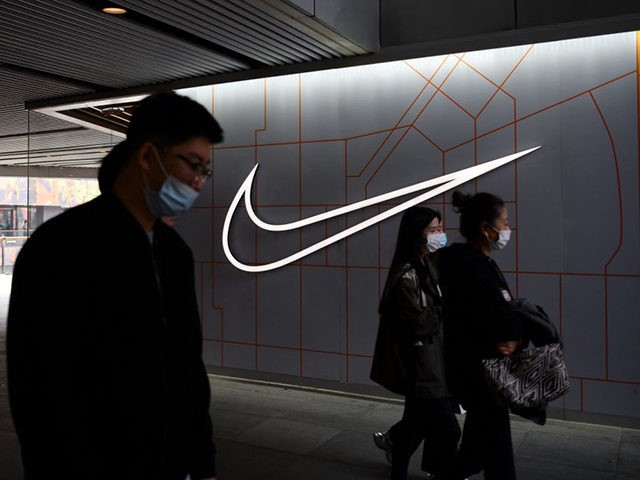Chinese state media outlets, the nation’s Foreign Ministry, and Communist Party-controlled social media launched a multi-pronged attack Wednesday against the multinational apparel corporation Nike following the discovery of a statement claiming the company does not use cotton sourced from Xinjiang.
Chinese media claimed Chinese “netizens” — social media users whose posts the government approves — had began posting photos and videos on government-controlled social media site Weibo disposing of or burning Nike products. At least one Chinese government-approved celebrity, actor Wang Yibo, terminated a sponsorship contract with Nike this week in light of the government campaign.
Xinjiang is China’s largest and westernmost region and home to the majority of the nation’s ethnic Uyghur population. The Communist Party has attempted to market “Xinjiang cotton” as some of the world’s highest quality. Extensive evidence suggests the Party enslaves members of the Uyghur minority, forcing them into the arduous task of picking and processing cotton nationwide.
Human rights groups estimate that 84 percent of cotton produced in China comes from Xinjiang, representing 20 percent of the world’s cotton. Uyghur advocates and human rights experts have maintained a campaign pressuring clothing companies not to source their cotton from Xinjiang, as it is impossible to ensure the cotton was not processed through forced labor.
Multiple governments and researchers have confirmed China has built a network of over 1,000 concentration camps in Xinjiang imprisoning as many as 3 million Uyghurs and other ethnic minority people. A study published in March 2020 by the Australian Strategic Policy Institute (ASPI) titled “Uyghurs for Sale” detailed extensive evidence that China had begun selling concentration camp prisoners to factories nationwide, using government incentives to promote the purchase of Uyghur slave labor elsewhere in the country. Nike was among 83 companies listed in the report manufacturing products in factories that had purchased Uyghur slaves.
The New York Times accused Nike in a report published in late 2020 of lobbying Congress to weaken provisions of the Uyghur Forced Labor Prevention Act which, if passed, would significantly limit imports from Xinjiang or those whose supply chain may be tainted with Chinese government-sponsored slavery. The bill would currently impose the burden of proof that a specific product was not manufactured by slaves on the company that wishes to import it, rather than requiring those suspecting forced labor to prove its presence in the supply chain. H&M, another company the Chinese government launched a campaign against this week, also appeared in the Times report as opposing parts of the Act.
Nike published a statement in July — according to Chinese social media, the statement appears undated on Nike’s website — expressing “concern” over the enslavement of Uyghur people in China. The statement claimed the ASPI report had falsely linked Nike to Chinese companies exploiting Uyghur slaves and that Nike did not source cotton from Xinjiang.
“Nike does not source products from the XUAR [Xinjiang Uyghur Autonomous Region, the formal name of the territory] and we have confirmed with our contract suppliers that they are not using textiles or spun yarn from the region.”
Chinese state publication Global Times described Nike on Thursday as “the next target” after a similar flurry of criticism against fast fashion company H&M for distancing itself from the Xinjiang cotton industry.
“The hashtag #nike has become the biggest trending topic on China’s Twitter-like social media platform Sina Weibo on Thursday with 720 million views and 530,000 comments over its announcement outlining its boycott of Xinjiang cotton,” the Global Times reported. “Chinese netizens called the announcement of the company disgusting and asked the brand to get out of Chinese market after it came to light that the company said it has prohibited any type of ‘forced labor’ across its supply chain in Xinjiang.”
The outlet Insider noted that Weibo appeared flooded with posts of people sharing “videos of themselves burning Nike Air Jordans and Air Force 1s, with some of these videos being reposted more than 100,000 times.” It did not specify any overt ties between those users and the Chinese government, though Beijing bans all statements on social media that contradict the opinions of the Party.
Global Times editor-in-chief Hu Xijin published an editorial on Thursday celebrating that Nike “has finally paid the piper” by facing a backlash from the Chinese government over its public rejection of forced labor.
“Chinese netizens have the right to look for and expose Western companies’ offensive statements regarding Xinjiang affairs. It is their right to express anger. Every country and market has its interests and self-respect,” Hu insisted. “You cannot ask Chinese side to step back and spare those companies so that they can be ‘politically correct’ in the West — all the while leaving Chinese consumers with damaged dignity.”
Hu concluded, “all multinational enterprises should stay away from geopolitics.”
On the same day, Hu’s publication celebrated that Chinese e-commerce site Alibaba had announced the opening of an official Chinese Communist Party committee within the nominally private company.
The Chinese Foreign Ministry also joined in attacking foreign companies for opposing slave labor.
“Chinese people do not allow some foreigners to eat Chinese food while smashing Chinese bowls,” Foreign Ministry spokeswoman Hua Chunying said on Thursday.

COMMENTS
Please let us know if you're having issues with commenting.